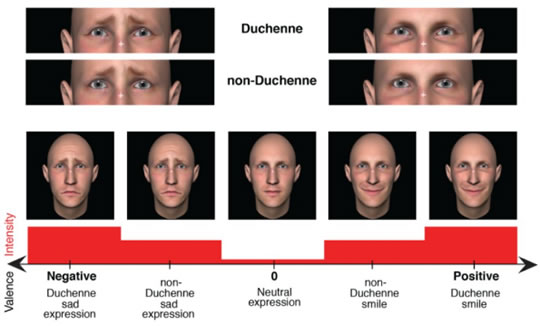Study uncovers how our eyes expose true feelings.
A wrinkling around the eyes means facial expressions are more sincere, research finds.
Whether it is signalling pleasure, sadness or pain, a tightening of the muscles around the eyes means a truer expression with greater intensity.
The study helps to demonstrate that there is a universal language for reading emotions.
The research involved showing people pictures of expressions with and without the characteristic wrinkling around the eyes, known as the ‘Duchenne marker’ after the French neurologist who first discovered it.
Below are some examples of Duchenne and non-Duchenne facial expressions.

People consistently rated the Duchenne facial expressions as more sincere.
They also thought faces with the characteristic wrinkling around the eyes were either more intensely sad or more intensely happy, depending on whether it was a smile or a frown.
Dr Nour Malek, the study’s first author, said:
“These findings provide evidence of a potential universal language for reading emotions.
In other words, a given facial action may have a single role across multiple facial expressions — especially if that facial action shapes your social interactions.
For example, knowing if a stranger’s smile is genuine and whether that person can be trusted, warns you whether you should evade or not.”
Professor Julio Martinez-Trujillo, who led the study, said:
“When you have social interactions you need to perceive whether a person is sincere or not.
So my interest now is, what will be the results if we do this same test with people with autism spectrum disorder.
They often have trouble reading out emotions from other people, so we wonder if that might have to do with their ability to read this marker for sincerity.”
The study was published in the journal Emotion (Nour et al., 2018).

